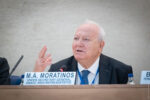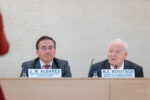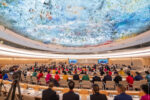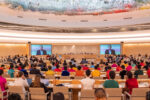Remarks by Under-Secretary-General Miguel Ángel Moratinos,
High Representative for the United Nations Alliance of Civilizations (UNAOC)
at UNAOC’s 3rd Dialogue on
“AI for #OneHumanity: Human-Centered Artificial Intelligence”
22 April 2025, Tuesday
Room XX, Human Rights and Alliance of Civilizations Room, Palais des Nations, Geneva
Excellencies, Distinguished Guests, Ladies and Gentlemen,
It is a great pleasure to welcome you to the 3rd UNAOC Dialogue on “AI for One Humanity: Human-Centered Artificial Intelligence”, co-organized by the United Nations Alliance of Civilizations and Fondación Onuart.
Your presence here today underscores the urgency of our collective mission: to harness AI as a force for good and ensure that it serves #OneHumanity in ways that are ethical, inclusive, and transformative.
Before we start, I wish to invite you all to a moment of silence to pay tribute to His Holiness Pope Francis, whose humility, universal love and gentle voice for peace will continue to inspire us all. I really ask for a minute of silence on behalf of His Holiness the Pope.
His Holiness had a clear position on AI.
In the G7 meeting in June 2024, His Holiness stressed Artificial Intelligence, and I quote, “…is and must remain a tool in human hands,’ and warned against artificial intelligence perpetrating a throwaway culture, favoring inequality and making decisions outside its purview.”
He called for the development of a very interesting concept, “algor-ethics”, a series of global and pluralistic principles which were capable of finding support from culture, religion, international organizations, and major corporations.
That, my dear friends, is the main aim of today’s meeting here in Geneva.
Yes, it feels like we’re living in our own science fiction movie. Technologies and innovations once deemed only imaginary are now part of our daily lives.
Let me paint a picture.
AI follows us from the moment we wake up….
Our smart phones greet us with tailored updates — that’s AI.
The thermostats in our homes adjust automatically, learning our habits — again, AI.
Our commutes are guided by navigation apps that not only avoid traffic but anticipate congestion before it happens — AI.
In offices, AI helps transcribe meetings and translate multi-lingual conversations in real time.
In schools and universities, it helps academics and researchers sift through massive datasets in seconds.
In hospitals and laboratories, it assists doctors by reading diagnostic scans with remarkable precision.
In creative industries and studios, it fuels artists and creators by helping to generate images, music, storyboards, and videos.
These are just a few examples. I can go on and on.
Indeed, AI is no longer in the background. It has become a central player in how we live, work, and communicate.
This isn’t science fiction. This isn’t the future. It is, my dear friends, the present.
And yet, amid all this innovation, urgent questions remain: How do we ensure that Artificial Intelligence does not reinforce biases, deepen inequalities, or undermine our shared values? Will AI serve our collective wellbeing, or will it infringe on human rights and erode fundamental values?
These are just a few of the questions that bring us here today. Questions that demand our collective reflection, collaboration, and action.
Recognizing both the immense potential and the challenges posed by AI, the United Nations has undertaken significant steps to ensure its ethical and inclusive development.
The Global Digital Compact, adopted at the Summit of the Future last year, sets a comprehensive framework to guide digital cooperation and AI governance, highlighting 3 key objectives: (1) inclusive development; (2) fair and equitable access; and (3) establishing transparency guidelines and accountability measures. To quote the United Nations Secretary-General, Mr. Antonio Guterres, “It brings the world together around a shared vision: One where technology serves humanity, not the other way around.”
Other efforts across the UN System — including the Secretary-General’s High-Level Advisory Body on Artificial Intelligence, UNESCO’s Recommendation on the Ethics of Artificial Intelligence, and the International Telecommunication Union’s flagship “AI for Good” programme — similarly emphasize the importance of global solidarity in the development and governance of AI.
In support of these efforts, I highlighted “the human dimension of AI” as a new priority area in the UNAOC Plan of Action 2024-2026, which I presented to the UNAOC Group of Friends last year. It is against this backdrop that we are gathered here today — to collaboratively shape a future in which AI advances mutual respect and understanding.
Today, looking around this room — the Alliance of Civilizations room at the Palais des Nations — I am heartened by your enthusiasm for dialogue and your spirit of collaboration to shape an AI ecosystem that benefits all of humanity.
Together, we can steer the trajectory of Artificial Intelligence towards a future where technology unites and empowers, rather than divides and excludes….Together, we can make a future of AI for #OneHumanity.
Thank you very much.





